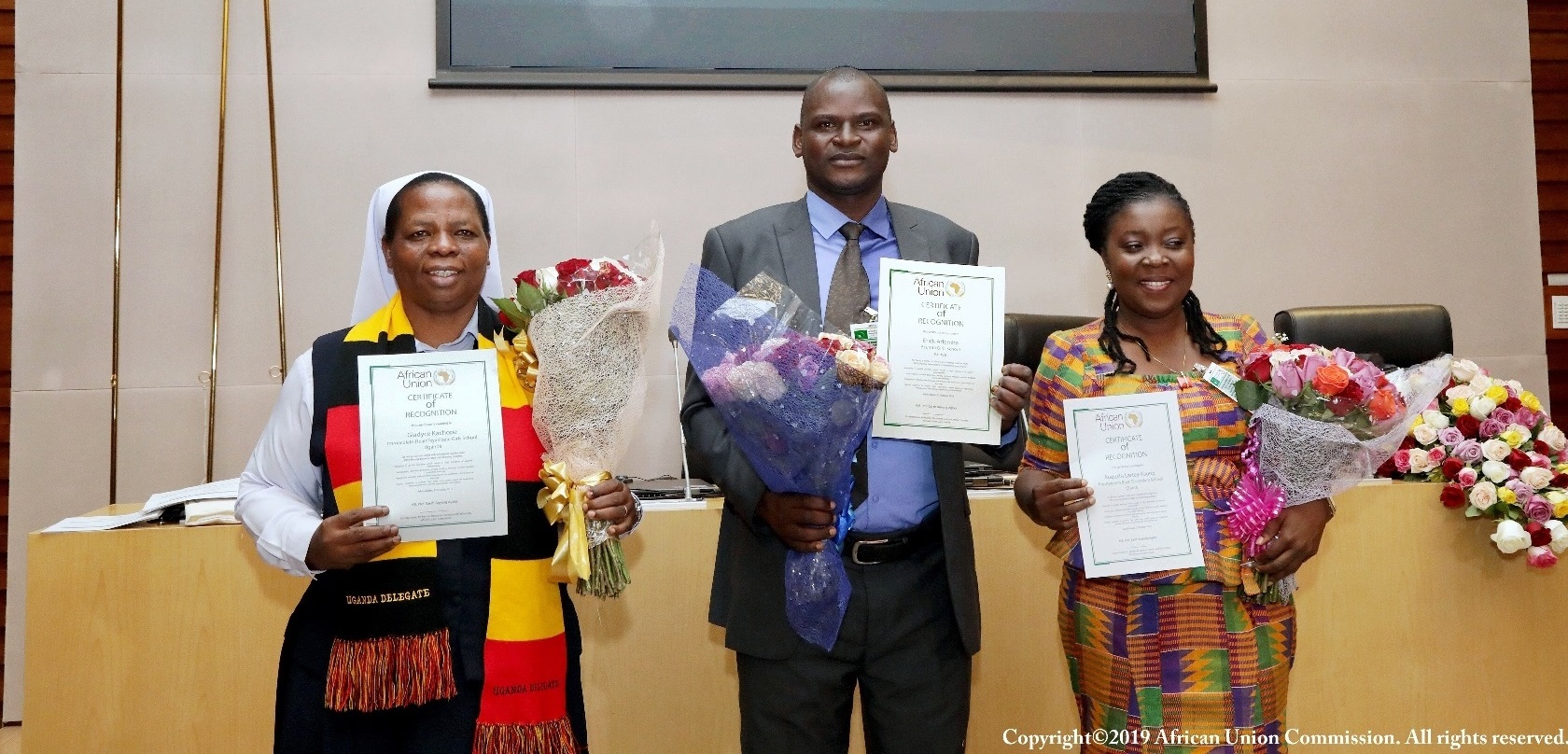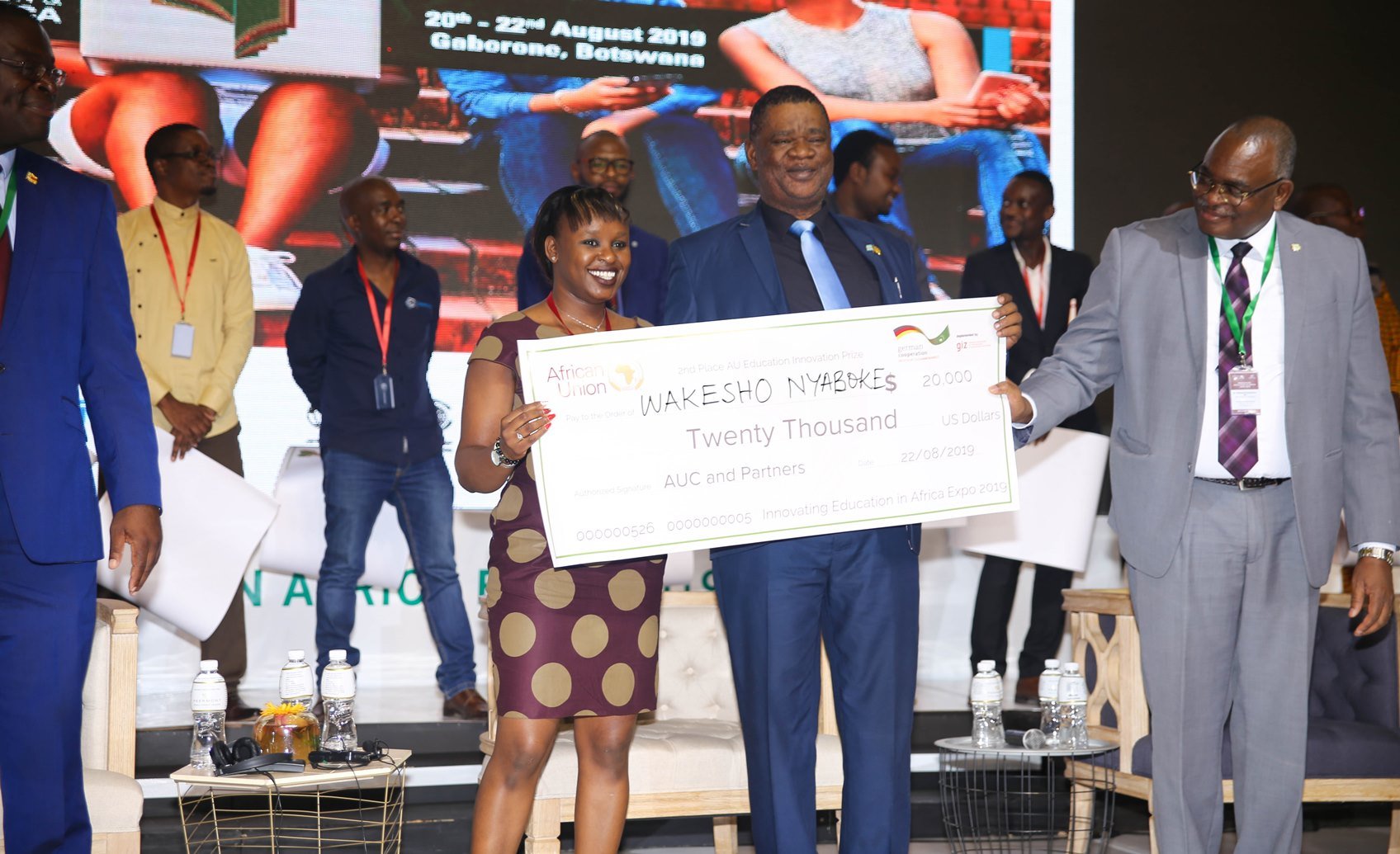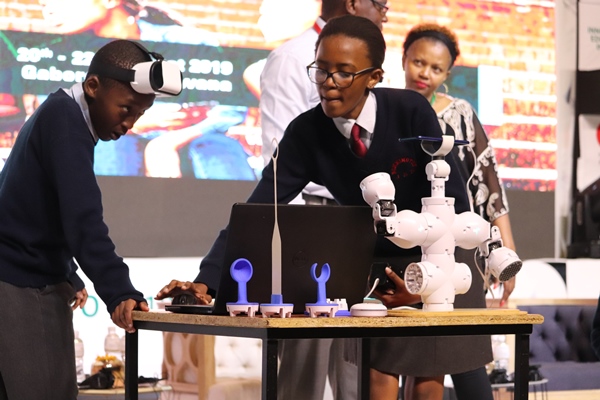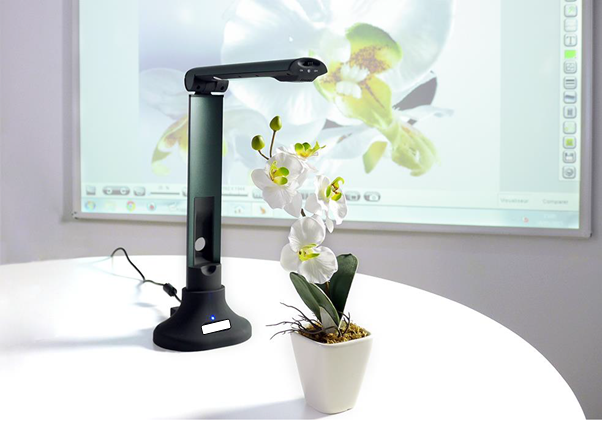
Title of Innovation: E-SOUKLOU
Year of implementation: 2016
Implemented by: YOB TECHNOLOGIES
Country/Countries where the Innovation is being implemented: Côte d'Ivoire
Problem being solved
In Africa, in terms of education-training, the plethora of class sizes (80-100 per class) makes practical training difficult for both teachers and learners; Which has the consequences: the difficulty of presenting documents or small objects to a class group; the demotivation of learners and teachers,
poor understanding of courses by learners; non-rationalization of learning time; the many photocopies (waste of papers); lack of interactivity in the classroom
Description of innovation
The solution is our AES 1507 device is an educational tool that presents itself as a desk lamp that films everything that happens on the desktop, transmits the image in real time by projecting it on a larger medium. In this way, all students will be able to access the content filmed on the teacher's desk.
In practical terms, how does our solution work?
In fact, during practical training sequences, trainers use the 3D digital device to project real objects (a technical object, manual, insect, experience, student's work or group work) on the board or on any other appropriate support, to avoid the crowds of students around them. In addition, the device is equipped with a video recorder that records the practical course sequence. The film in this hands-on course sequence is published online or on a local computer so learners can re-visualize as many times as they like. In this way, they will be able to better understand what they have not identified in the present.
This solution revolutionizes education and training in that it makes it easier for teachers and students despite the plethora of classrooms; Teachers easily present technical objects to the class group; Teachers and learners are motivated as there is time savings for teachers and a better understanding of courses for learners; In addition, there is no need to make several photocopies to present images and the like.
Outcomes and Impact
We have about 15,000 students who benefit from our services in 04 institutions. The success rate is increasing in these institutions.
Our project has a positive impact on education and training in that it guarantees learners quality training despite overcrowded classrooms.
The use of the device reduces the use of paper in schools by 40%. So we have an impact on the environment by reducing the misuse of paper in schools.
Our business solution and strategy is tailored and accessible to all learners, even those in rural areas
Potential to be scaled and replicated
Our medium-term goal is to have a larger manufacturing unit of the device in Côte d'Ivoire to serve all of Africa. To do this, we need 1 million euros. It should be noted that the need we meet exists in all African countries. The project can therefore be deployed across the continent.
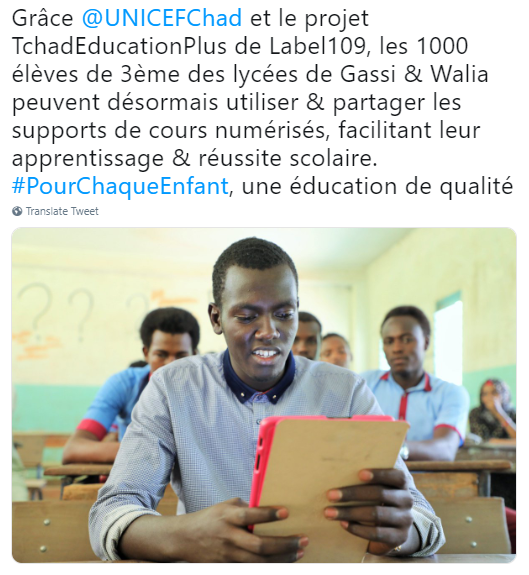
Title of Innovation: TchadEducationPlus
Year of implementation: 2017
Implemented by: Label 109
Country/Countries where the Innovation is being implemented: Chad
Problem being solved
Chad is among the countries of Africa with high number of pupils per textbook: in 2012, 5 pupils per reading book, 4 pupils per book of calculus and 16 pupils per science book (Chad, State Report on the National Education System, 2016) Primary , only 4.4% of students have a reading manual and 3.6% in mathematics (PIET 2018-2020) Nearly 80% of students do not have a book. In high school, the situation is still very alarming. Irregularity in the school calendar and non-completion of content due to strikes is recurrent.
Description of innovation
Following the finding of a serious shortage of textbooks and a misallocation of existing ones to students and teachers and the lack of resources of the State to overcome this problem, the digital era, digital and of mobile offers an unprecedented opportunity to solve the educational divide, the disparities of content for public and private institutions more resource-rich, rich and poor children, we set up the project CHADEDUCATIONPLUS, which aims to improve access to course materials for primary and secondary education through digital and mobile We collect course materials from the best educational institutions, develop digital books (PDF) and stand-alone mobile applications free and free access via the project platform (http://www.tchadeducationplus.org), mini memory card for phone and the by Xender or Bluetooth.The project was realized with financial support from UNICEF for the pilot phase for the third grade during the 2017-2018 school year and for the development phase for the entire secondary school. the current year 2018-2019 and also with the help and partnership of the Lycée Saint François Xavier whose teachers have made the course materials available. "
Outcomes and Impact
Our pilot phase for the third grade improved access to digital and mobile classrooms for 1,000 students from two pilot CEGs (General Education Colleges) and the establishment of a library of 1000 papers course materials for students who do not have phones that support digital media. And also more than 30,000 downloads of course materials in e-books and applications. The current secondary phase will improve mobile and digital access to classroom materials for more than 8,000 students from the two pilot high schools and the implementation
Potential to be scaled and replicated
Innovation can be zoomed in, replicated and supported everywhere. There is a need for a quality school that can provide course materials to be digitized and developed into a digital book and application. All you need is programs or coders that can develop application course materials and e-books. A website developer to design the site to house the application and E-book course materials. Financial support is needed to implement the project.
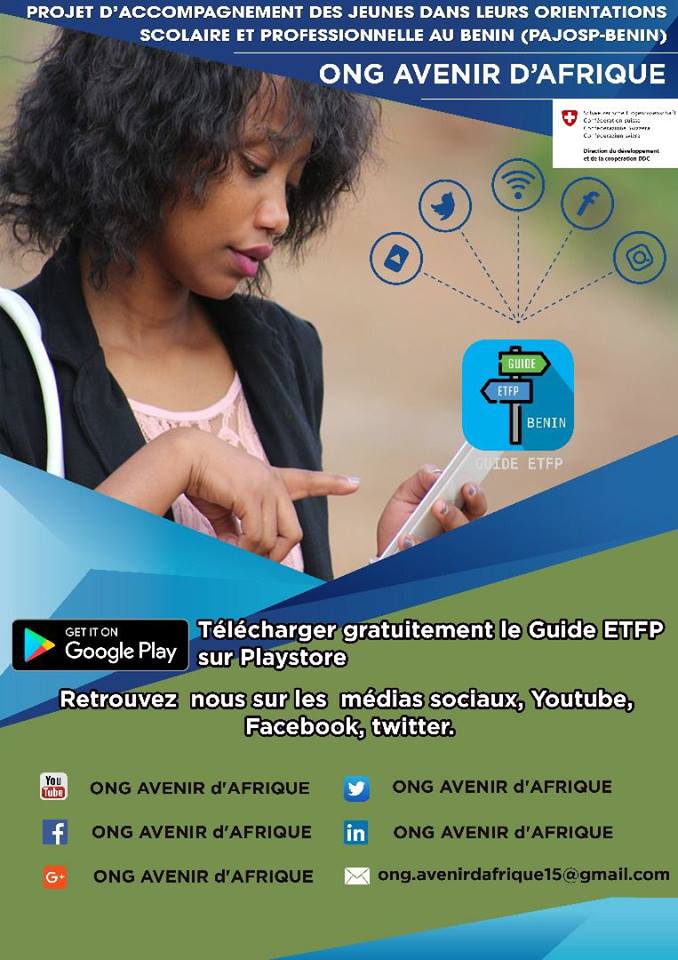
Title of Innovation: ETFP GUIDE Benin
Year of implementation: 2017
Implemented by: ONG AVENIR D'AFRIQUE
Country/Countries where the Innovation is being implemented: Benin
Problem being solved
In Benin, school guidance is reduced to general classics. The lack of guidance, the unavailability and / or the lack of access to information on offers of technical and vocational training require learners who wish to take vocational courses to move towards the general and others to drop out of school. This, in spite of article 55 of the law n ° 2003-17 of November 11th, 2003 on the orientation of the national education in Benin which says: «the right to the guidance advice and to the information on the lessons and the professions makes integrating part.
Description of innovation
We have set up a communication, attractiveness and awareness system on EFTP (Teaching and Technical and Professional Training), in order to change the mentality of parents, teachers and learners on the image of EFTP (EFTP CONTINENTAL STRATEGY, African Union, p21) in Benin, in other words it is the paradigm shift at the level of the players involved. It contains the following tools: the GUIDE ETFP and the Film-Documentary the choice of the Future. The ETFP guide is a collection of accredited technical and vocational schools and centres in Benin with their training offers following detailed modules, access conditions, practical advice and opportunities. It allows the learner to know in advance what to expect after training as an income-generating activity, a guarantee of total empowerment. It allows each learner to make a succinct and profitable choice capable of providing him with self-employment immediately after his training. Innovation is the virtual version with the mobile app that accompanies the paper version. Aware of the stakes and influence of ICT, our organization has thought to make a mobile application compatible with smartphones and Android available to the Education System and the people of Benin to make it easier to access the ETFP Guide. This app is available on Play Store. Just go to Google Play Store and type EtFP Guide, download the app and install it on your phone. It is in agreement with the Government's Programme of Action.
Outcomes and Impact
The various tools designed have enabled us to impact more than 8,500 school and out-of-school learners who are able to undergo technical or vocational training, 3,500 parents of pupils and 1,000 college teachers in Benin. We also have the agreement of the Ministry in charge of Teachings, Secondary, Technical and Professional Training of our country for the extension of tools throughout the country. The ministry's DEFI Pro project, aims for the same goals as we do so a partnership is in sight to meet the challenges related to school orientation in colleges.
Potential to be scaled and replicated
Given these different aspects, it will be crucial for each country to have a guide to teaching and technical and professional training in mobile application for the paradigm shift at the level of parents, learners and teachers and to know also the opportunities related to TVET (entrepreneurship, practical skills for practicing a trade). To replicate this innovation in every African country, it takes political will and funding for the implementation of this innovative device.
_EDBox.jpg)
Title of Innovation: EDBox (Education digitale box)
Year of implementation: 2016
Implemented by: ED4free
Country/Countries where the Innovation is being implemented: Benin, Burkina Faso, Chad, Comoros, Côte d'Ivoire, Democratic Republic of the Congo, Gabon, Mali, Senegal, Togo
Problem being solved
Of all the digital revolutions, the e-education revolution is arguably the most strategic for Africa, as only a significant contribution of digital educational resources will support the need for education and training of hundreds of millions of young Africans. And yet this opportunity, which makes sense in a context of lack of schools and universities, seems totally ignored. That's why ED4free, which is committed to digital solutions, has designed the digital education box to provide access to tens of thousands of educational content, accessible without the internet.
Description of innovation
EDBox is a nano server that allows students, teachers and parents of students to access tens of thousands of educational content without access to the internet. Teachers can use these digital resources in the classroom.
Accompanied by a mini projector, EDBox can be used to simulate concepts that are difficult to represent, to show or demonstrate the functioning of a mathematical, biological, physical, chemical, etc. process. The box is also a library of downloadable resources that allow students to have documentary resources from all disciplines and formats from developed countries. This gives students equal opportunity in access to knowledge.
The pedagogical uses of this device are numerous: (self) teacher training, preparation of a course, courses in front of students, provision of free educational content for download on smartphones in wifi, for teachers, parents, students. They apply to schools, adult training center, universities.
Finally, EDBox also incorporates an open-access cloud that collects and distributes educational resources that will be accessible online and via nanoservers.
It is completely modular in that the content it hosts can be selected according to the type of education (primary, college, high school, higher education, adult education) and located according to the countries.
Technically, it's a Raspberry PI nanocomputer, with Raspbian as the operating system.
Outcomes and Impact
The impact of this technology is enormous from the point of view of access to knowledge and quality of education.
It allows learners to access content from all over the world and more accurately address themes with demonstrations, simulations and interactive activities. This probably contributes to a wider access to knowledge and allows a student to have the same educational content as his classmate who is on the other side of the world.
The effect this will have is an increase in the quality of education and a new chance of access to knowledge for those who were out of school.
Potential to be scaled and replicated
Our technology has the advantage of being very modular in its design. EDBox is already used in several African countries and for each country, the content is contextualized, tailored as needed. The box is already showing its ability to reproduce and adapt. It adapts to all contexts and works with simple batteries for areas with no electrical current. These two links show EDBox in Côte d'Ivoire and Benin:
Site web : http://ed4free.ovh/
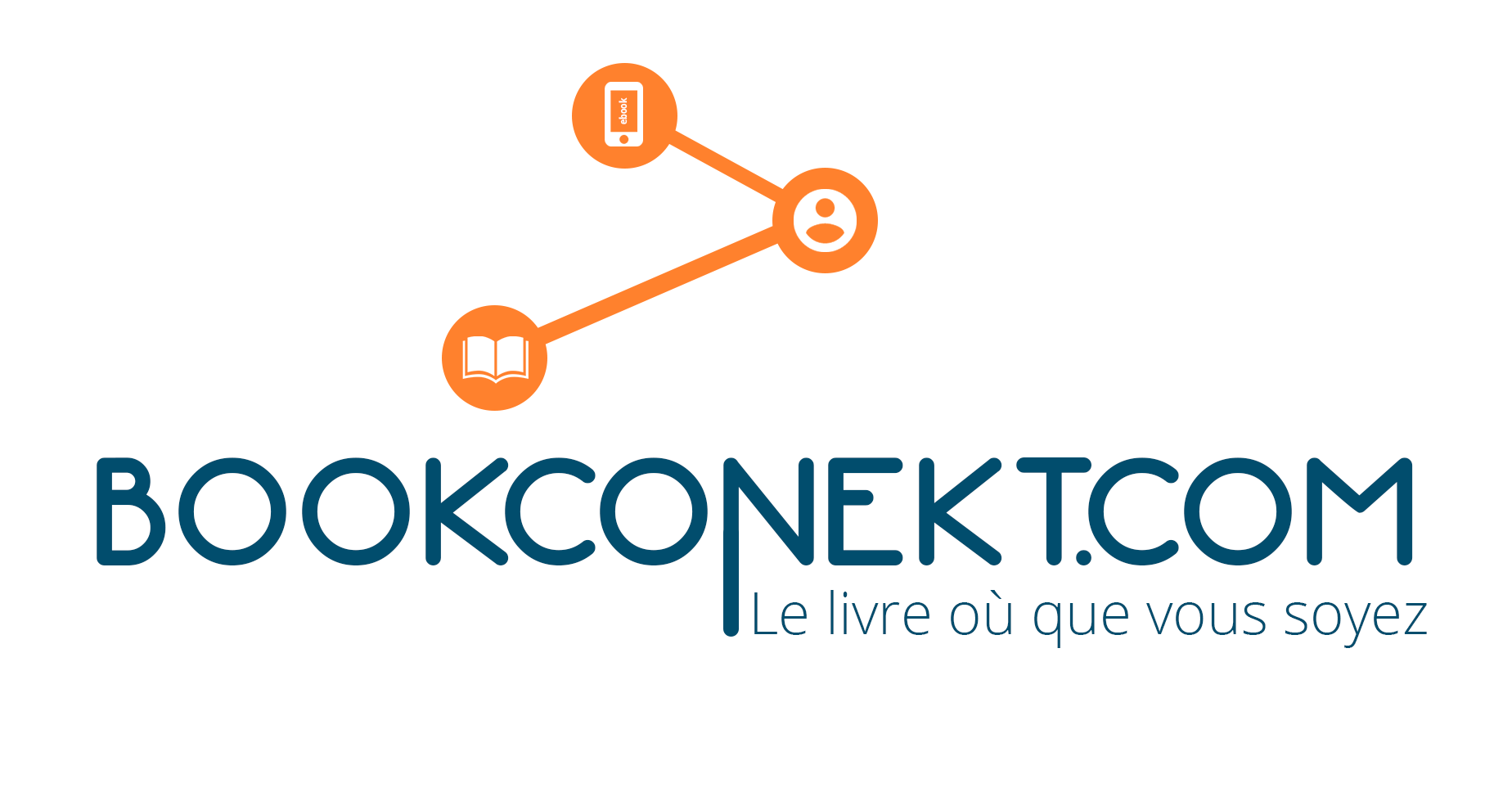
Title of Innovation: BOOKCONEKT.COM
Year of implementation: 2011
Website: www.bookconekt.com
Implemented by: BOOKCONEKT.COM
Country/Countries where the Innovation is being implemented: Benin
Problem being solved
Less than 1 in 3 schools in Benin have a library, denying students the chance to gain crucial knowledge and language skills. Lack of access quality reading materials lead to poor academic performance and high school graduates often cannot express themselves clearly in either writing or speaking, compromising their future. Parents and young adult can currently access books by visiting libraries and bookstores, most of which are located in Cotonou and not accessible online. This means traveling in heavy traffic for hours and spending time searching products from store to store with deception when books needed is not found
Description of innovation
We are a social start-up that aims to improve literacy rates by providing affordable and universal access to quality reading materials. With one click, BOOKCONEkT.COM provides access to any books anytime, anywhere through a mobile and virtual library and bookshop. Users can either buy or borrow whether virtual or hard books with delivering at home.
Parents and young adults are our primary customers. They represent a market estimated at $200 million. we are their preferred choice.
- Low cost: Our website offers the lowest prices, and saves our customers the time and cost of travelling to bookshops or libraries
- Convenience & safety: Kids can access products through our online catalogue without having to take public transport.
- Variety: We offer academic books, romance, novels, comics, African and local productions.
- Re-sell option: we are starting the first-ever Benin online book market (second hand) space where people can sell their used books and get income. Low income users will be able to buy used books at cheaper prices, and resell them later.
- Single platform: We partnered with local bookshops to use our platform to reach more customers instead of building their own online presence. Moreover, we will offer advertising to publishing houses and authors to promote their productions.
Early-adopters of our website are 80% parents and 20% young adults or school students. We take advantage of a rapidly growing digital commerce market in Benin to overcome financial and geographical barriers to reading.
Outcomes and Impact
December 2017-January2018:Initial landing page launched; $50 profit and 30 books sold within 2-month test period
2017-2018:$6050 raised from Tony Elumelu Entrepreneurship program 2017 and competition Get In The Ring Cotonou 2018
August 2018:BOOKCONEKT.COM launched, offering mobile bookshop and library including e-payment through MTN Mobile Money. In 6 months we received 5000+ visits and distributed 100+ books with $300 in revenue and growing followers on Twitter and Facebook.
Partnerships:Agreement with Transportation Company, 5 famous publishing houses, 2 physical libraries.
Training:Mandela Washington Fellowship 2018, etristars.com 2018
Potential to be scaled and replicated
We will just need to have sales team in countries. They will negotiate partnership with local bookshop and library to upload their content on the platform. Then, we will create an adaptation for each country like BOOKCONEKT.SN for Senegal. We will do like amazon or jumia. The sales team will communicate about the book-market place so that people upload their books to be sold. The book market place will be very useful as most of our population has a very low income.
Page 5 of 7


